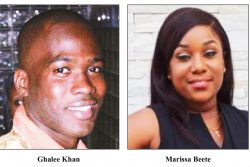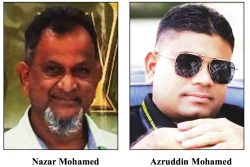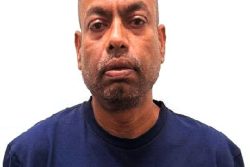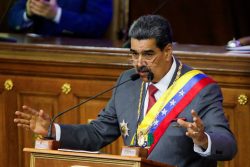-questions linger over licence
By Chevy Devonish
After decades of state monopoly of the airwaves, the privately-owned Radio Guyana Inc. (RGI) was officially launched on Thursday but questions remain about the basis on which its licence was issued.
RGI is part of a media group which also includes TVG Guyana and the Guyana Times, all owned by Queens Atlantic Investment Inc in which Dr Ranjisinghi Ramroop is a principal.
Radio Guyana was among several radio broadcasters to receive their licences in January of this year and is the first of the lot to have commenced its operations, effectively calling time on the decades-old monopoly maintained by the state-owned National Communications Network (NCN), formerly the Guyana Broadcasting Cor-poration (GBC).
In a release on Thursday, RGI announced that its operations would be conducted out of the TVG building on Quamina Street, and that it intends to provide twenty-four hours of mixed genres and styles of music. “In order to remain aligned with the interest of the listeners Radio Guyana announced that R&B, Soca, Bollywood Hits, Selective chutney, Hip-Hop and Reggae Music will be aired, and that their broadcast can be heard on whether 89.5FM or 89.7FM,” the release said.
It was also stated that considering Guyana’s ethnic and religious make-up, there will be daily religious segments incorporating the three main religious groups. Although primarily a music station, it was announced that room will be made for public service announcements, bridge and weather reports. In addition, citizens in the Diaspora as well as online users should be able to tune into Radio Guyana Inc. wherever they are as the station will be streaming live via the internet at www.radioguyanafm89. com.
Applications
In October of 2009, Stabroek News had reported on a ruling made by the Guyana Court of Appeal that the Government of Guyana (GOG) was maintaining an unlawful monopoly on the airwaves and it said that the National Frequency Manage-ment Unit (NFMU) was not doing its job with respect to considering radio license applications.
This decision was made to address a case brought by the owner of then Vieira Com-munications Limited (VCT), Anthony Vieira, who charged the NFMU with procrastinating over the years on radio licence applications.VCT had applied for a radio licence since 1993 and the court determined that both the government and the NFMU had failed to even acknowledge receipt of the application.
The court stated that eight years had elapsed since the establishment of The Com-mittee on Radio Monopoly Non Partisan Boards and Broadcasting Legislation, set up by then President Bharrat Jagdeo and Opposition Leader Desmond Hoyte and that there was no indication that a report by the committee had been compiled and submitted by the government.
According to the Appeal Court panel, no one has an absolute right to a radio broadcast licence because of the constitutionally prescribed limitations which circumscribe the freedom of expression and the freedom to communicate ideas. It also ruled that the application by VCT for radio broadcast privileges was attended to by indifference and callous discourtesy in that it never received acknowledgement of its application and a response from the NFMU, adding that more so, it was affected by inordinate delays on the part of the NFMU in giving consideration to the request.
Subsequent to this ruling, government voiced its commitment to liberalising radio broadcasting, saying that the ruling was consistent with its own position to end the monopoly on radio. Then President Jagdeo himself had articulated his commitment to liberalise the sector, but stated that this would only be done after new broadcasting legislation would have been enacted.
Since then, VCT in its entirety, including the business office and studio at Quamina Street and the transmission site at Versailles has been bought over by the Ramroop Group of Com-panies.
Observers have questioned the circumstances surrounding the approval given to the TVG owner to carry out both television and radio broadcasting, especially since many other media establishments, such as television broadcaster CNS 6 who applied for a radio licence since 1999, were yet to receive approval.
According to one prominent broadcaster, it is quite possible that when Vieira sold his company, he also sold all rights and privileges associated with the company, including its television broadcasting licence as well as its pending radio broadcasting licence. It is still unclear whether Radio Guyana’s licence was awarded based in VCT’s 1993 application or if an entirely new application was lodged and approved. Either way, the granting of the licence would not have been in compliance with Jagdeo’s and Hoyte’s agreement that no new broadcasting licences would be issued until a new broadcast authority was in place.
This newspaper attempted to contact the radio station for clarification on this issue, but was told by the company’s spokesperson that she would not be divulging information on the matter.
The legality of the licensing is still a major issue of contention as many claim that since TVG Guyana is an entirely different company and was also under different management, it should have gone through the application and scrutiny process to determine whether it and/or its managers were fit and proper to be awarded with a licence.
Stabroek News attempted to contact the Managing Director of the NFMU Valmikki Singh to solicit clarification of the legality of this arrangement but was told that he was unavailable for a comment.
Bibi Shadick, Chairman of the Guyana National Broad-casting Authority (GNBA), stated that she was unable to say whether or not the law allowed for the transference of a broadcasting licence after a buy-out or any similar situation. She added that the board never looked into the matter due to the fact that TVG Guyana had been issued their radio licence before GNBA’s board was appointed and therefore it dealt with the company as one in receipt of a valid broadcaster’s licence.
The licensees approved for radio broadcasting by President Jagdeo last year shortly before the general elections are seen as aligned to government.








